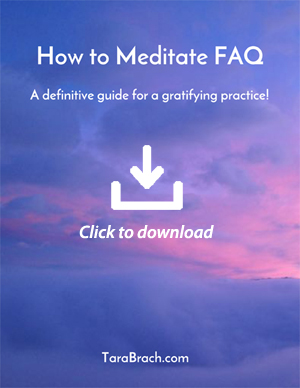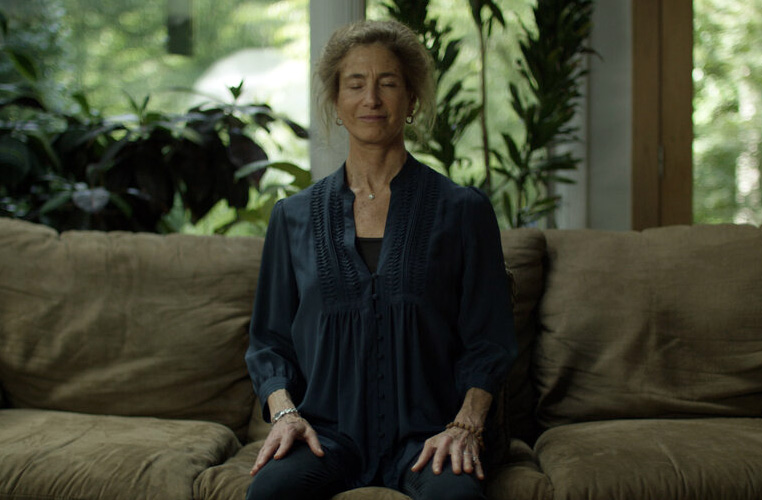The following interview originally appeared in the Fall 2003 issue of Inquiring Mind (vol. 20 number 1). © 2003 Inquiring Mind. Reprinted by permission. www.inquiringmind.com
Inquiring Mind: In your book you talk about being caught for years in what you call “the trance of unworthiness,” always feeling as if something were wrong with you. How did you first realize that you could let go of that story and accept yourself?
Tara Brach: Somewhere in my early twenties I realized I was pretty constantly monitoring myself, judging how I was always falling short, whether it was about not being a good enough daughter or friend, or my appearance, or whatever. I ended up becoming involved with a spiritual path in the yogic tradition, living in an ashram, doing a very rigorous spiritual practice. It was understood that we had a lot of flaws—negative thoughts, cravings, jealousy, anger, lust—and we were using these practices to help us transcend our ego and purify ourselves. This really fit in with my belief that something was wrong with me.
I married another yogi, and when I got pregnant, my husband and I decided to go to a monthlong yoga gathering with our teacher, to be held in the desert. While I was there I ended up having a miscarriage. I sent a message to my teacher saying what had happened and wondering if the hot sun and exercise might have contributed. I didn’t hear from him until three days later when I went to the daily gathering—hundreds of us under a big tent. He asked me to stand up and then angrily berated me, telling me I had never wanted to be a mother, I was too ambitious in my work as a therapist, and it was my fault I had a miscarriage. It was the most humiliating and painful experience I’d ever had. Somebody I really wanted to appreciate me and love me had actually turned on me ragefully.
I went off to a little sanctuary in the desert and sobbed and sobbed, trying to understand how I could be so bad that he would turn on me like that. I didn’t believe that I had caused the miscarriage, but what was it about me that made him attack me like that? After many hours, I realized that either I was going to believe his message that something was wrong with me, or I was going to trust that I was okay. I found myself saying, “I want to accept myself completely, just as I am.” I reached out to the universe to help me do that and found an openness and tenderness I’d never experienced before. I knew I could hold myself with that absolute love and compassion.
IM: After so many years of believing something was wrong with you, how could you in a moment so fully accept yourself?
TB: Along with judging myself harshly, I’d also always seen the truth of goodness in me. I’d known that I had the capacity to love, that I enjoyed seeing other people be happy, that I had a real awe and wonder about the beauty of this world. But it was the enormity of the suffering I was experiencing right then, the basic separation and loneliness that came from being turned against myself, that gave me such a deep resolve to embrace myself. I registered the dukkha of self-aversion with such clarity that I knew there was no freedom unless I could love this life without holding back. This didn’t mean I was going to ignore my flaws and stop seeking to improve what I could. But in the deepest way, I was not going to fixate on the conclusion that something was wrong with me.
IM: Did that habit of judging yourself just fall away then?
TB: Self-judgment continues to arise—it’s a strong habit—but the fact that I made a conscious commitment to recognize it has helped me stop feeding the story of being unworthy.
IM: Do you mean you were choosing a different story?
TB: No. While I was choosing not to believe a story that was harmful, that doesn’t mean I was replacing it with another story. I wasn’t saying: “I don’t believe I’m bad, and I do believe I’m good.” It was more a matter of opening myself to the inherent goodness in an experiential way by feeling my heart, by seeing and trusting what is true.
Stories about ourselves and about the world continually arise in our minds and shape our beliefs about reality. There are stories we take on from our culture, and there are stories based on our own personal history. Some of those stories lock us in limiting beliefs and lead to suffering, and there are others that can move us toward freedom. What I am most interested in is what happens if we have an unhealthy story of self, a story of falling short, and how do we work with that?
Most of us grew up with a very damaging story that something is wrong with us. Gradually—or as in my case, suddenly—we become resolved not to believe this anymore. It takes a dedicated practice to follow up on that resolution, because the conditioning is very strong to keep generating self-demeaning stories. In the process of deeply accepting our own inner experience, instead of being identified with a story of a limited self, we realize the compassion and wakefulness that is our essence.
IM: So we free ourselves from negative and harmful stories by accepting and allowing whatever we’re feeling?
TB: Emotions are the interaction of thoughts and of sensations in the body. The process of radical acceptance is to accept that a story has appeared in the mind, and then deepen the attention to see clearly what’s happening in the body, to regard those feelings and sensations with kindness and acceptance, and to notice how they come and go. For example, I might find that I have a habit of being jealous and comparing myself with other people and riveting my attention on how much somebody else is accomplishing or doing, or how much better they are at such and such. First, I might recognize the story—the mental images and internal dialogue—and say, “Okay, comparing mind.” Then, rather than staying caught in the content, I’ll bring my attention into my body and open to the immediate feelings that are there. If I don’t pay attention to these feelings, they just fuel more stories and I stay stuck in the suffering of a small, deficient self. No matter what feeling comes up—numbness, irritability, shame—if I let it arise and play itself through, I naturally open into wakefulness and care.
IM: As a Buddhist teacher you teach mindfulness as a way for people to skillfully regard their stories and not get caught in them. As a psychotherapist you almost, by definition, value the story. How do you put those two together?
TB: Stories can be a jumping-off point to access the emotions and the sensations in the body. By taking the time to explore charged memories in therapy we might uncover feelings that have been buried for decades. It is natural that our minds replay old stories, because that is our own mechanism for trying to work out unresolved problems. Yet rerunning those stories will be a fruitless looping until we learn how to move from the story into our body. This is why therapy alone often doesn’t bring full healing and awakening. With mindfulness training we are able to recognize when we get lost in our mental dramas, and bring a kind and nonreactive presence to the feelings that accompany them.
IM: What you call “radical acceptance” sounds much the same as mindfulness practice. Why do you choose to use that particular term?
TB: Because we have such a deeply grooved conditioning to reject and condemn ourselves, particularly in this culture, I find that emphasis on the word “acceptance” is central in healing. It brings our attention to the possibility of saying yes to what we are experiencing in the moment, and counteracts the conditioning to push away what feels unpleasant or intense or unfamiliar. In a basic way, acceptance is seeing clearly what’s happening and holding it with kindness. This is a radical antidote to the suffering of judging mind. We discover, as Zen master Seng-tsan said, the freedom of living “without anxiety about imperfection.”

